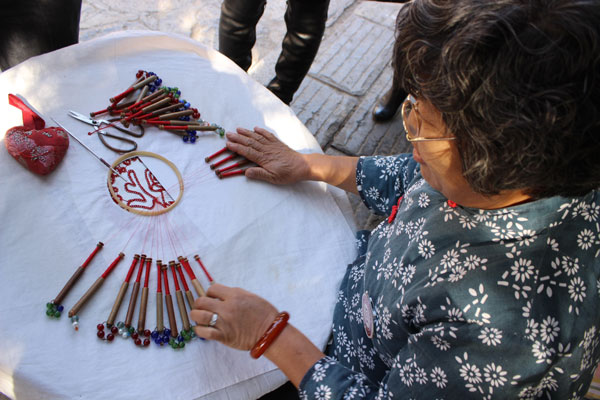 |
|
A local woman demonstrates her embroidery skills.[Photo by Wang Kaihao/China Daily] |
Cuoqin, a musical instrument with more than two dozen strings that looks like a combination of violin and the Chinese guqin, is one such discovery of the project. The cuoqin was popular in ancient Qingzhou after originating from the Warring States (475-221 BC), and was described by some scholars as among the world's oldest string instruments.
However, when a cuoqin was found in Zhao Xingtang's home in 2005, he wasn't able to play it. His grandfather was a cuoqin performer, but the skill wasn't naturally inherited by younger members of the family.
"I have to rummage through my childhood memories to learn it all by myself again," he says, adding that these days he has some 20 students that he can teach it to. "The gap was gradually filled."
Unfortunately, even if some instruments have been recovered, traditional melodies have been lost. Today, the performers use modern lyrics.
More than 700 items of Qingzhou's intangible cultural heritage have been categorized, but restorers are still faced with the common dilemma: how to prolong the items' lives. Like many other places in China, the city has created a space where people can learn traditional skills, but Li says it might not be enough to preserve such items.
An ancient-style neighborhood was completed in Qingzhou in 2013, and since then more than 40 key inheritors of the intangible cultural heritage are paid 50 yuan ($8.20) a day by the local government to perform in front of visitors for five hours a day.
At China's third national exposition on intangible cultural heritage, held recently in the provincial capital Jinan, Xu Xianghong, head of Shandong provincial cultural department, called the ancient skills and arts the city's lifestyle. "It was unfair to simply demolish them without serious consideration."
"We need to create an atmosphere to balance their original characteristics and the younger generation's aesthetic sense," Xu said at the event, urging private sector participation as well.
Perhaps, tourism is a way to preserve Qingzhou's culture.
"When there is protection and tourism, the different sectors will be encouraged to participate in the project due to the huge social and economic benefits," Li says. "It's difficult to tell people that dying traditions are precious through regular education in classes."
But when people come into direct contact with endangered culture, they will likely become more aware of the need to protect it, he adds.
|
|
|
|
|
|
|
|
